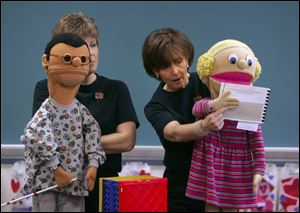
Waterville: Children get lessons to accept disabled
2/22/2006
Kay Barbour, left, and Brenda Engle use puppets to teach students in Waterville Elementary School about mental and physical handicaps and how to accept them.
It's OK to be different.
Third-graders at Anthony Wayne's Waterville Elementary learned that and other lessons from puppets representing children with several physical or mental disabilities.
"You're going to meet real boys and girls like them," said Brenda Engle, one of the two puppeteers from the Holland-based group The Kids on the Block.
The group is a national program that provides scripts to more than 1,600 sets of local puppeteers around the world. All the puppets are based on real children who are blind, deaf, or have cerebral palsy, learning disabilities, or Down syndrome.
In the hour-long presentation, puppets with disabilities talked with puppets without disabilities about telling time on a Braille watch or playing soccer in a wheelchair.
Both puppeteers, Ms. Engle and Kay Barbour, are needed to operate Mandy, a puppet representing a child who is deaf, so that they could teach the children some sign language, such as signs for boy, girl, yes, and no. They also sang and signed a song.
The show is designed to teach children that despite differences, either obvious or subtle, people with disabilities and people without disabilities are all people.
"There is not one kid in this classroom who's perfect," one puppet representing a child with a learning disability told the third-graders.
The puppet shows also give the children plenty of opportunities for asking questions about what life is like for people with disabilities.
Whether they wanted to know how many times a puppet with learning disabilities goes to the tutor or whether a puppet with Down syndrome has ever been bitten by the pets she cares for as a veterinarian's assistant, there was an answer.
Rinaldo answered questions about how he puts a straw in a juice box without being able to see and how he uses a computer that prints Braille and text to do his homework.
Mark Riley, the first puppet created when the program began in 1977, got laughs for telling the students about running over his teacher's toe with his wheelchair. He had a serious message for them as well, telling them not to ignore people with disabilities but to include them as his friends include him in games, sometimes changing the rules.
The local Holland-based group covers 13 counties in Northwest Ohio. It was funded by the Northwest Ohio Special Education Regional Resource Center for many years, but for the past three years, Ms. Engle and Ms. Barbour have been running it on their own. The Anthony Wayne presentations are supported by the parent associations at the primary schools.
Third-grade teacher Polly Miller said the district has been having the group make their presentations for more than 10 years to raise awareness among the students.